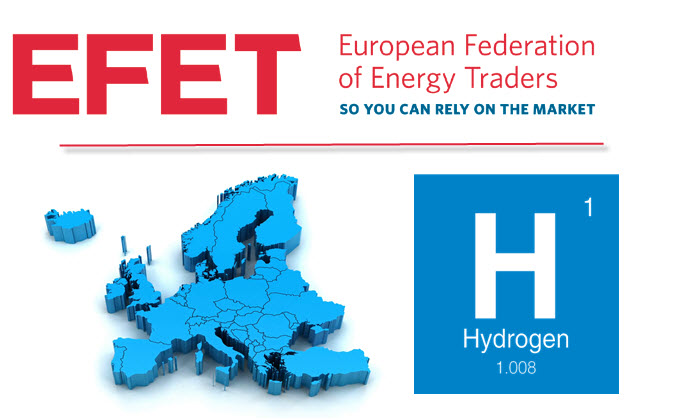
EFET comments on the Roadmap for an EU Hydrogen StrategyThe European Federation of Energy Traders (EFET)¹ welcomes the European Commission’s initiative to develop a roadmap for an EU Hydrogen Strategy,² designed to be linked with the Future EU Strategy for Energy System Integration.³
The objectives of both initiatives reflect the interest of EFET in cost-effective decarbonisation of the European economy by harnessing market mechanisms and linking the gas and power markets at wholesale level.4
In order to contribute to the overall efficiency and flexibility of Europe’s energy system,hydrogen must become an integral part of the European internal energy market. The establishment of the IEM has been an enormous achievement since the implementation of the early Electricity and Gas Directives.
Ensuring a harmonised regulatory framework for the future gas market in Europe- where hydrogen, as well as other low carbon, renewable, and decarbonised gases, are set to play a more prominent role – will, in turn, require a revision of the European Network Codes and other existing regulations such as Renewable Energy Directive II.
The roadmap should also take into consideration the future strengthening, reforming and expansion of the EU ETS to include a recognition of the carbon abatement achieved through the replacement of natural gas with (abated) hydrogen.5
We believe that, in order to deliver on their ultimate purpose, that is, to facilitate cost-effective decarbonisation of the EU economy, both the future EU Hydrogen Strategy and the EU Energy System Integration Strategy should be underpinned by the following five policy priorities.
Policy priorities to underpin a cost-effective decarbonisation of the EU economy
1. Setting an ambitious, economy-wide climate neutrality objective at Union level
2.Strengthening the EU ETS in the short term, as it currently applies to power generation and heavy industries, then reforming and expanding it to become a long-term driver for decarbonisation across the EU economy
3.Utilising market-based mechanisms and adapting market instruments whenever financial support for new, low carbon energy sources is considered while respecting sectoral unbundling rules
4.Ensuring pan-European coordination and cross-border implementation of any financial support schemes for renewable, decarbonised and low carbon gases, especially in case national end-use prohibitions of hydrocarbons should be foreseen
5.Insisting on technological neutrality of measures, to include a level playing field between power and gas systems, so that users face a cost-reflective allocation of costs across both types of grid, without cross-subsidisation
We look forward to continuing our dialogue with the Commission about the development of both initiatives. In the meantime, we will also be engaging with other relevant external parties that play a role in the debate on the future integration of Europe’s energy system and development of a hydrogen market, in particular regulators, TSOs, national governments, and industry associations.
Read the most up to date Fuel Cell and Hydrogen Industry news at FuelCellsWorks




